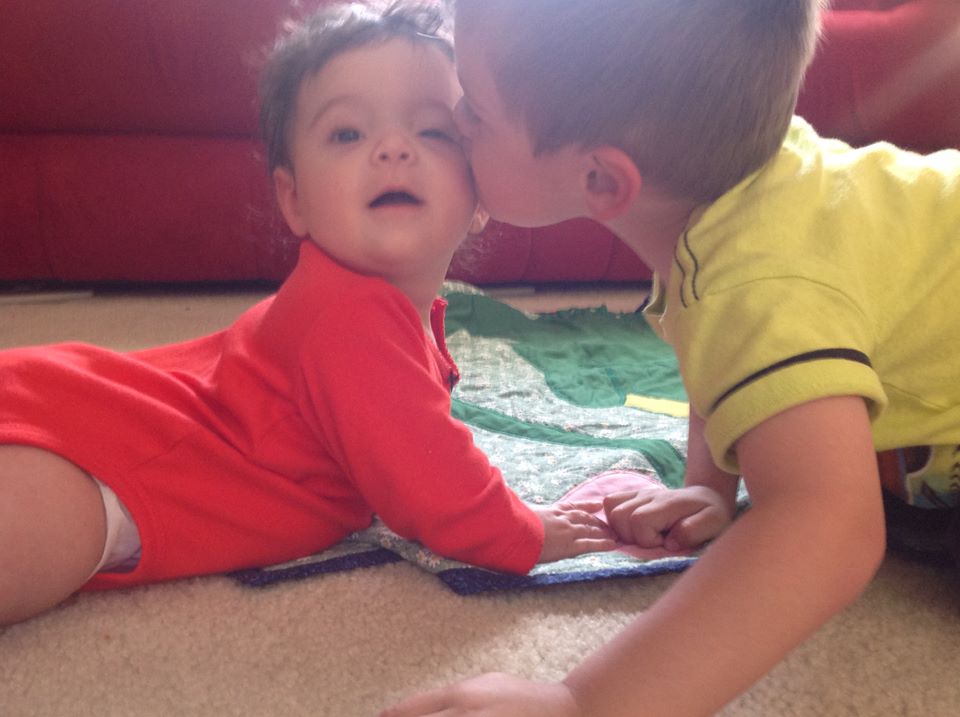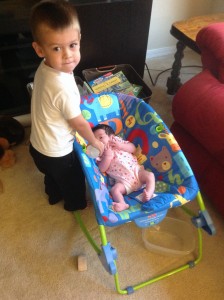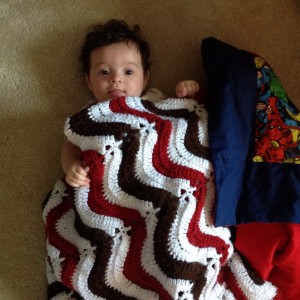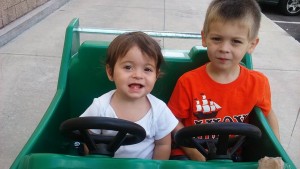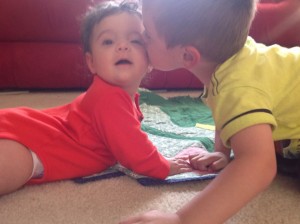My biggest parenting worry, before becoming a parent, hands down, was sibling rivalry. Understanding child development, allowing the child to work on brain-building activities, talking to them one on one–I have pure confidence in all of this. The worst nightmare that I could think of was a child coming up to me to tell me, “Mommy, he hurt me!” with the other child swearing, “It was an accident!” What do you do?
This was all excacerbated by the book The New First Three Years of Life by Dr. White. He warns to space children every 3 years apart, because taking care of 2 children under the age of 3, he argues, is completely terrible. Dr. White also advocates authoritarianism, with dire warnings of a child who won’t develop well if you don’t “discipline” them. The first edition of his book advocates spanking. The “New” edition lowers this punishment to timeout.
On September 29, 2014, I welcomed our second child, a girl, into our lives. My son was 2 years, 5 months. They are now 10 months and 3 years, 4 months. The relationship they have is beautiful. The story between them is one I really want to tell. So, here it is.
When it comes to sibling relationships, it is widely regarded that this is the one place where authoritarianism is needed. You have to protect one sibling from the other right? If one hurts the other, it is justification to rain hell on the aggressor, right? I completely rejected this and I am here to argue that treating each individual child with respect is the key to healthy sibling relationships.
Before I gave birth to my second, I was sure to do some reading about sibling relationships. I chose to read Siblings Without Rivalry by Adele Faber and Elaine Mazlish. This is a great book and I insisted my husband read it. Some major takeways that I got from it was to never compare children to each other, e.g., “Your brother is eating his broccoli. Why can’t you?” I had also read two of their other books, Liberated Parents, Liberated Children and How to Talk so Kids Will Listen. Faber and Mazlish were students of Dr. Ginott, whose book, Between Parent and Child is an absolute must read. Combined, these books really give a philosophy of how to handle a child’s emotions, which, at its most basic message, is to always validate their emotions.
When I first brought my daughter home, I was very mindful of the emotions I would create in my son when he was near her. If every time he was near her and potentially hurting her, I said, “STAY AWAY FROM YOUR SISTER! YOU MIGHT HURT HER YOU NAUGHTY LITTLE THING!” I think he would very quickly learn to associate his sister with negative emotions.
A mother I knew was in a similar situation where she had a 3 year old and a newborn at home. When she went to the bathroom, the newborn was crying, and the 3 year old hit the newborn. To be sure: this is an absolute trigger for many moms. For me, it was not even that one child hit the other (not as the trigger) but the feeling of “I can’t even go to the bathroom.” It is a natural and justifiable reaction to be very angry. This is something you should think about how to deal with before bringing home a second child. (In my opinion: Be prepared to simply be “Babysitter” during some times of the day: No doing dishes. No cleaning. Designate one adult to always be with the children, especially if one child is 9 months or younger. Go to the bathroom at your own peril.) To her credit, the mom took a moment to “process it.” She then bragged that she gave her son “4 counts of punishment.” Later, she said her son told her he was trying to protect his sister. She said this helped calm her down about the character of her son and that, “Somehow in his mind hitting was helping.” Yes, he did think he was trying to help his sister. It has been argued by many, and I agree, that children are almost never intentionally malicious. And now in his mind, helping his sister is associated with punishment.
A young child is going to be intensely interested in this living, breathing, exciting toy, known as their sibling, that you just brought home. What happens when I pat her on the head? What happens when I tickle her feet? Instead of punishment, I used a lot of redirection. Ask the child: instead of relentlessly patting her on the head, can you give her a kiss or a hug or bring her a toy? Show them how they can interact with their sibling. Keep the emotion that they feel when around their sibling as a positive one.
My son, our “great helper,” helping his sister with a bottle,
One thing I did with my son was to bring his awareness to the baby’s emotions. When everything was calm and she was on the floor with him, if he pulled her leg and it made her upset, I asked, “Did that make her happy or sad?” If he made a funny face, I asked, “Did that make her happy or sad?”
I was hesitant to do this at first, because young newborns are sometimes fussy for seeming no reason at all, that even parents sometimes can’t figure out, and I did not want my son to get the message, “She is sad because of something you did,” when that wasn’t the case. But this worry never materialized. In fact, I think this is the principle to give to your child. Not “no hitting” or “no pulling” but “watch the other person’s emotions.” To my surprise, he was sometimes rough with her and she loved it. As such, *I* backed off from telling him “don’t do this” or “don’t do that.” Instead I watched for the reaction that his sister got. This principle has carried with him from then until now: he is mindful of her emotions. If she is upset, especially if he knows he may have caused it, he rushes to make her laugh, usually by making silly faces. I hope that it carries such that in the classic sibling fight of “I’m not touching you!”, which stems from a parent’s way of setting down a rule about an action, which is always never quite exact enough, he instead realizes, “Actually I’m irritating you and that isn’t good.”
There can be no denying the power of being a good role model in front of your child. I have a philosophy of parenting infants, which is to look for a child’s cues and to always respond appropriately to them, i.e., to provide “on demand” feeding and sleeping, not trying to get the child “on a schedule.” My son saw this day in and day out. When the baby would cry, he saw us desperately trying to see if she was hungry, sleepy, poopy, and, if not, walking and singing to her to calm her down. He saw how every time she cried, we responded. Now if she cries, he says, “We have to calm her down!”
When she was crying when she was little, my son would sometimes say, “I know baby, I know,” trying to console her, in a way clearly mimicking what I might say to her.
When I was making her a bottle once, she was crying, and my son got her a blanket. It did calm her down! We have also always encouraged him to move on his own initiative and solve problems on his own.
One time I forgot the baby monitor downstairs, where he was playing, and I took a shower. She started fussing. From the shower, I heard my son go into the baby’s room, then come into the shower, very worried to tell me, “The baby is crying! We need to rescue her!”
Can it be denied that this, the example he sees from us and the practice he gets routinely of tending to her, is setting the personality framework of a budding hero, potential caregiver, good father, good husband, and, of course, good big brother?
And as I write this, I remember now, that we had this philosophy of always caring for him when he was an infant. Surely he can feel how happy this made him and would want this for his sister.
We did go through a period where he kept hitting his sister. Babies go through predictable fussy periods as argued by the book Wonder Weeks, where their brain is growing and at first it is scary, thus the fussiness. It took me a while to figure out that a relentlessly irritable baby is annoying for me and it was annoying for my son too. During one fussy period, he kept hitting her. I didn’t know how to handle it. Thankfully I read Positive Discipline: A – Z. The introduction alone helped me. It argued to act more, talk less. So, every time he hit her, I physically moved him away from her and said “No hitting.” It took about 24 hours of this and he got the message. Before this I was trying to use redirection and some other things, to no avail. When it comes to physical safety, negotiating/reason is not a good tactic. Swift, painless action, with few words, is best. We do have two general “No” rules because of this, which are “No hitting” and “No pulling.”
When things are more calm, more clever tactics can be used. One time my daughter was making cooing noises while we were in the car. My son said, “DON’T sing BAAAA BY!” My first reaction was to tell him, “Sweetheart, she’s allowed to sing.” But I had just been reading about curiosity questions. I said, “You don’t want her to sing?” He said, “Yes. I don’t want her to hurt herself!” I don’t know how singing = hurting oneself in his mind, but it did. And using some curiosity questions, I was able to fish that out and better deal with it.
The worst thing that happened between them is one time when we were packing to go to the beach. I had put my infant daughter in the car seat, naively thinking she was safe there. My husband was packing some stuff up and I was in the bathroom. I then heard a THUNK followed by the most intense screams I have ever heard from my infant. My son had pushed her off of the table that the car seat was on to the floor. It was terrible.
I don’t doubt the reaction of most would be to swiftly punish, even hit, my son. Emotions were terribly high that day. Perhaps because I was forced to have some time before I dealt with it, I came to the conclusion that my son needed some love and empathy. He was in total tears: he knew what had happened. My husband tended to our daughter while I scooped my son up and took him into a completely different room. Through tears, he was trying to explain that he wanted to get her into the car. I was not able to calm him down for the life of me. I told him I totally understood it was an accident, but she was still hurt, and we needed to apologize for that. He didn’t want to, so I said I would, and I did. Later, he apologized to his sister on his own.
Some people may worry that a child doesn’t “learn their lesson” if they are not punished. Well, let me tell you the evidence I have that my son does get it. Every night we do a “happy/sad” part of the day. Around when my son turned 3, he started giving genuine, thoughtful answers that were his own. Up until then, he gave the same one every single night or asked us to do ours while he listened. And when he started to reveal his actual happy/sad parts, the sad parts often involved when his sister was sad, even when he was the cause of it! This is why I believe, despite our lack of punishment, he does get the message that it is undesirable to hurt his sister. It’s not something we literally beat into him; it’s a principle we have slowly instilled into him.
My son undeniably loves his sister. He spontaneously tells her “I love you, baby.” He tells her she is beautiful. We sometimes talk about what we are thankful for, and every single time he says he is thankful that the baby is his friend. When we are in the car, if she is upset, he may say to her, “Baby, we are almost home!” One time we were going to a restaurant and she was crying. He said, “Baby, we are going to a restaurant and it is FULL of food!” I have to think he was using the Dr. Ginott “Give in fantasy what you can’t give in reality” tactic, where you even exaggerate what the child wants. He makes silly faces at her and does dances to calm her down and make her laugh. My favorite is when we were going home, at night, and she started to fuss. He said, “Baby we are almost home,” but then he said, as if realizing something, “Oh, but you’re worried.” It was as if he was saying to her, “There there. It’s OK. It’s nothing to cry about,” but then he realized this invalidates her emotions and the emotion he saw in her was “worry.” She is his first best friend, for sure.
He buckled her in:
What amazes me in all of this is I never once tried to make my children have a healthy relationship. If my son liked his sister, I knew, would be up to him. Instead, I focused on treating each of them with respect, as individuals, tending to their developmental, physical, and emotional needs, as best I could. But the results have been jaw dropping to me. Although my son is 3 and can count to 100, recite dozens of songs, and read a map, their relationship is what I am most proud of as a parent.
My worst fear of a parent, sibling rivalry, is now my greatest pride.
My favorite photo. Ever.
